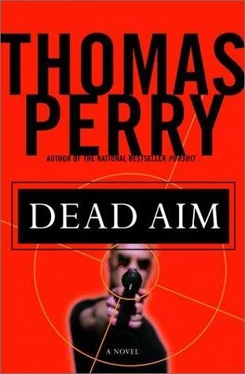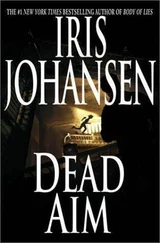Thomas Perry - Dead Aim
Здесь есть возможность читать онлайн «Thomas Perry - Dead Aim» весь текст электронной книги совершенно бесплатно (целиком полную версию без сокращений). В некоторых случаях можно слушать аудио, скачать через торрент в формате fb2 и присутствует краткое содержание. Жанр: Триллер, на английском языке. Описание произведения, (предисловие) а так же отзывы посетителей доступны на портале библиотеки ЛибКат.
- Название:Dead Aim
- Автор:
- Жанр:
- Год:неизвестен
- ISBN:нет данных
- Рейтинг книги:4 / 5. Голосов: 1
-
Избранное:Добавить в избранное
- Отзывы:
-
Ваша оценка:
- 80
- 1
- 2
- 3
- 4
- 5
Dead Aim: краткое содержание, описание и аннотация
Предлагаем к чтению аннотацию, описание, краткое содержание или предисловие (зависит от того, что написал сам автор книги «Dead Aim»). Если вы не нашли необходимую информацию о книге — напишите в комментариях, мы постараемся отыскать её.
Dead Aim — читать онлайн бесплатно полную книгу (весь текст) целиком
Ниже представлен текст книги, разбитый по страницам. Система сохранения места последней прочитанной страницы, позволяет с удобством читать онлайн бесплатно книгу «Dead Aim», без необходимости каждый раз заново искать на чём Вы остановились. Поставьте закладку, и сможете в любой момент перейти на страницу, на которой закончили чтение.
Интервал:
Закладка:
CHAPTER 10
The Safe-Force School of Self-Defense was not easy to reach. Mallon followed the route with a road map while Lydia drove. They were over forty-five minutes north of Ojai on the winding highway into Los Padres National Forest before they spotted the turnoff on the right. They followed the smaller tributary road eastward into the rising, tree-covered hills as the pavement narrowed into something under two lanes. At several points, flat spaces beside the shoulders had been cleared to provide turnouts so a driver could pull over and let vehicles behind him pass.
The first sign of habitation on the road was a high chain-link fence that began before Mallon noticed it. Mallon had simply tired of looking to his right into some woods that ran up a slight rise and left no view. He stared ahead at the road for a time, looked to the right again, and saw that a fence had begun. He turned around in his seat and verified that it stretched back for some distance. It had not caught his attention at first because there was tall brush on the inner side that had grown through the wire, keeping the fence in shadow, muting the metallic gleam and keeping the eye from perceiving the straight boundary line. The coiled razor wire along the top was above eye level, and in some places climbing plants had grown into it as though it were a trellis.
After a time an open gate interrupted the fence. There was no sign, but an oversized rural mailbox at the first gatepost had the stenciled words SAFE-FORCE SCHOOL. Between the posts was the beginning of a long, straight gravel drive that led into the property, past some low wooden buildings and one in the distance that looked about the size and shape of a barn. A short way in there was a parking lot on one side of the drive that held about fifteen cars, and on the other, a sprawling one-story ranch house with a rough board exterior and a large roofed-over front porch above a row of benches and a drinking fountain.
Lydia drove into the parking lot and glided to a stop between two freshly painted white stripes. She turned off the engine and opened her door. In the sudden silence they both heard a distant report of a gun. As Lydia stood, she turned her head and listened. There was a rapid pop-pop-pop. She pointed up the long, gradual slope of the hillside beyond the driveway. “Sounds as though the rifle range is over there someplace.”
“Yeah,” said Mallon. “Only that sounded like a pistol, didn’t it? Maybe a forty-five, or a nine-millimeter?”
“Sounds about right to me,” she said.
They closed the car doors and walked across the driveway toward the low ranch house. As they approached it, a tall, lean man in a khaki shirt with button pockets and tinted aviator glasses stepped out of the building onto the porch to wait for them.
The gunshots had come from the other side of the long hill, where a young woman named Marcia Teller held her nine-millimeter Smith amp; Wesson pistol at her side, muzzle downward, as she walked carefully along the path at the bottom of the arroyo. The combat range was supposed to be a simulated battle, but the battle had rules. There could be no accidental discharges, no wild shots of the sort that indicated she was afraid of her weapon, and if a round misfired and jammed the gun, she would have to stop, flop to her belly, and clear it before she showed herself again.
As she took her next step, another target popped up to her right, a cardboard cutout in the shape of a man’s head and torso. She went to a two-handed grip and a bent-kneed crouch, fired three shots into the target’s chest, then pivoted to face forward again. The targets were spring-loaded on their own stands so they could be moved to different hiding places each day. The range master triggered them with a remote control.
She walked up the arroyo another hundred feet, watchful and tense. She knew she had gotten the first two with something close to perfection, and it made her feel more serious, more committed to the game.
The third one popped up ahead and to her left, so close it made her jump. She let a small involuntary cry escape as she dropped to one knee and fired twice through its chest. She stood and advanced again. The third target had been good for her. It had reminded her that all the speed necessary was in efficient, deliberate movement: it pops up, you aim, you fire. When she had come out here the first time, she had mistaken the course for a quick-draw contest, and she had failed humiliatingly. Now she was calm and unhurried, and she was splendid.
The next ambush was especially devious. The target came up behind her: how had she passed that bush without seeing it? She did as her instructors had drilled her to do, not shuffling to turn in place but stepping, bringing her foot around with her so that before she faced the target she had already moved a pace to the side. She fired too low this time, maybe not a fatal first shot, but she compensated by bringing the barrel up, and when she fired again she saw a spot of light open in the center of the faceless head.
Marcia remembered to repeat the step-around to face forward in time to see the next target appear ahead of her, as though the two targets had been trying to get her in a crossfire. She placed two rounds into that one, and dropped to the ground to reload. She pressed the catch to release the magazine, removed it from the bottom of the grips, and put it into the pocket of her canvas jacket. Then she inserted a new clip and used the heel of her hand to push it home. She pulled the slide to cycle the gun and put a round into the chamber, then looked up, rose to her feet, and stepped forward.
There were ten targets-assailants, enemies-and she spotted all of them, one after another. Sometimes, as in the fourth and fifth, more than one came up in rapid succession, as real enemies did, ganging up, taking advantage of the very ability to focus and concentrate that she had so laboriously developed to become a competent pistol shot. Everyone had been told that a “pass” was to get all of them. Wasn’t that what would have been required in real life? The one you missed would kill you-a “fail.” There were no grades beyond those.
At the end of the arroyo she leaned her backside against a big sandstone rock, released the magazine, and cleared the round that was left in the chamber, then stood waiting for Parish to come up and congratulate her.
It was Spangler, the firearms instructor, instead. He was striding up the arroyo in his khaki shorts and hiking boots and red sleeveless T-shirt. “Good shooting, Marcia!” he called. “It’s a pass!”
She looked up from her weapon and smiled diffidently to hide her disappointment. “Thank you, Paul,” she said. Her eyes moved beyond him and flicked here and there to interpret distant shapes, searching for the tall, thin shape of Parish.
Spangler read the expression. “Michael had to run off ahead of us a minute ago. He got a call to tell him there were some visitors.”
“Did he see the shooting?”
“Oh, sure,” said Spangler. “Practically all of it. He said to tell you he would speak with you later.” He looked back up the long, twisting streambed, glanced at his watch, then turned to her. “Come on. Let’s go look at your targets.”
They walked to the last one, and he used his index finger to poke each of the holes she had put into the effigy. “Here’s your fatal shot, to the heart. This one down here would be very painful and incapacitating, but not a kill.” He took two gummed squares of paper from his pocket and stuck them over the bullet holes so the enemy was healed, then pushed the metal rod that held the target back into its trap so its catch held the target down. He placed a few cut boughs over it, stared at it critically, and moved to the target she had shot before that one.
Читать дальшеИнтервал:
Закладка:
Похожие книги на «Dead Aim»
Представляем Вашему вниманию похожие книги на «Dead Aim» списком для выбора. Мы отобрали схожую по названию и смыслу литературу в надежде предоставить читателям больше вариантов отыскать новые, интересные, ещё непрочитанные произведения.
Обсуждение, отзывы о книге «Dead Aim» и просто собственные мнения читателей. Оставьте ваши комментарии, напишите, что Вы думаете о произведении, его смысле или главных героях. Укажите что конкретно понравилось, а что нет, и почему Вы так считаете.












